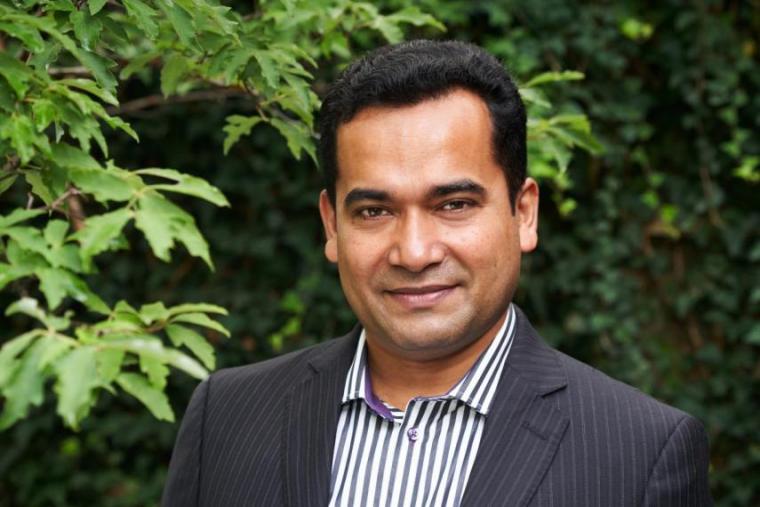
How society adopts agricultural innovations is as critical as the technologies themselves. Professor Ataharul Chowdhury’s work with a new global initiative highlights the social dynamics of technology adoption, combating misinformation and fostering collaboration to ensure sustainable food systems.
The challenges facing global agri-food systems are increasingly complex. From climate change to misinformation about agricultural innovations, the stakes have never been higher. To tackle these challenges, a global research effort [1], the Center for Sustainable Plant Innovation and Resilience through International Teamwork (C-SPIRIT), has brought together scientists from Canada, South Korea, the UK, Japan, and the US, including Dr. Ataharul Chowdhury, a professor in OAC’s School of Environmental Design and Rural Development [2].
C-SPIRIT focuses on stabilizing food production by unlocking the potential of natural chemical diversity in plants and microbes. By developing sustainable solutions that enhance crop resilience, nutrient uptake, and immune responses, the initiative aims to support a future where agriculture is both productive and environmentally sustainable.
Bridging Science and Society
While much of C-SPIRIT’s work centers on technical innovations, Chowdhury’s research highlights an often-overlooked but critical aspect of agricultural progress: the social dynamics of technology adoption. His work addresses how society perceives and integrates new agricultural technologies, ensuring that innovation reaches and benefits the communities it is designed to serve.
“My contribution to the initiative is the community-engaged research and development,” Chowdhury explains. “This includes understanding agri-food stakeholders’ (mis)perceptions of gene technologies, organizing webinars, engaging with media and the public, and developing resources to counteract misinformation.”
Chowdhury’s expertise is particularly relevant in an era of growing skepticism toward science. “Tech adoption is not simply a technical undertaking of convincing individual farmers to adopt something,” he says. “It is important for sustainable production when viewed from an innovation lens. As such, it is part of a socio-economic and political process, where various ideas, values, and interests shape knowledge about a new technology and its use in society.”
This holistic approach ensures that technological advancements resonate beyond the lab and the farm, extending to farming communities, advisory organizations, consumers, markets, and policymakers. “Tech adoption,” Chowdhury adds, “is part of a process that aligns social, economic, and environmental domains, all of which are necessary for supporting sustainable food production.”
Chowdhury is also the graduate coordinator for OAC’s Capacity Development and Extension programs, where students examine themes of technology adoption and communication.
Building Trust Through Engagement
A key focus of Chowdhury’s work within C-SPIRIT is combating misinformation about agricultural innovation. From genetically modified organisms to regenerative farming practices, misinformation can hinder progress and breed mistrust among stakeholders. By fostering dialogue and developing accessible educational resources, Chowdhury’s efforts are pivotal in bridging the gap between scientific discovery and societal acceptance.
“Societal resistance and acceptance of technology have implications beyond the laboratory or farm,” he notes. “Our vision for C-SPIRIT is to advance Canadian initiatives of inter- and transdisciplinary research and development through international teamwork.”
A Future Beyond Borders
Chowdhury and his colleagues are already envisioning a long-term Canadian version of the global centre. By fostering international collaboration and local implementation, the initiative exemplifies how research can tackle complex global challenges while addressing the unique needs of individual regions.
“Our work is about advancing agricultural sustainability while addressing real-world concerns,” Chowdhury says. “This is what excites me most—combining scientific rigor with societal relevance.”
As part of a global effort to ensure food security and sustainability, Chowdhury’s research reminds us that technology alone cannot solve humanity’s challenges. True progress requires understanding and addressing the social fabric in which these technologies operate. His work ensures that science does not merely “innovate for innovation’s sake but transforms lives by creating a resilient, equitable, and sustainable future for all.”
C-SPIRIT exemplifies the power of international teamwork, and Chowdhury’s contributions underscore the importance of integrating social sciences with cutting-edge agricultural research. Together, they are creating solutions that will help secure the world’s food systems for generations to come.